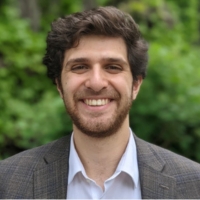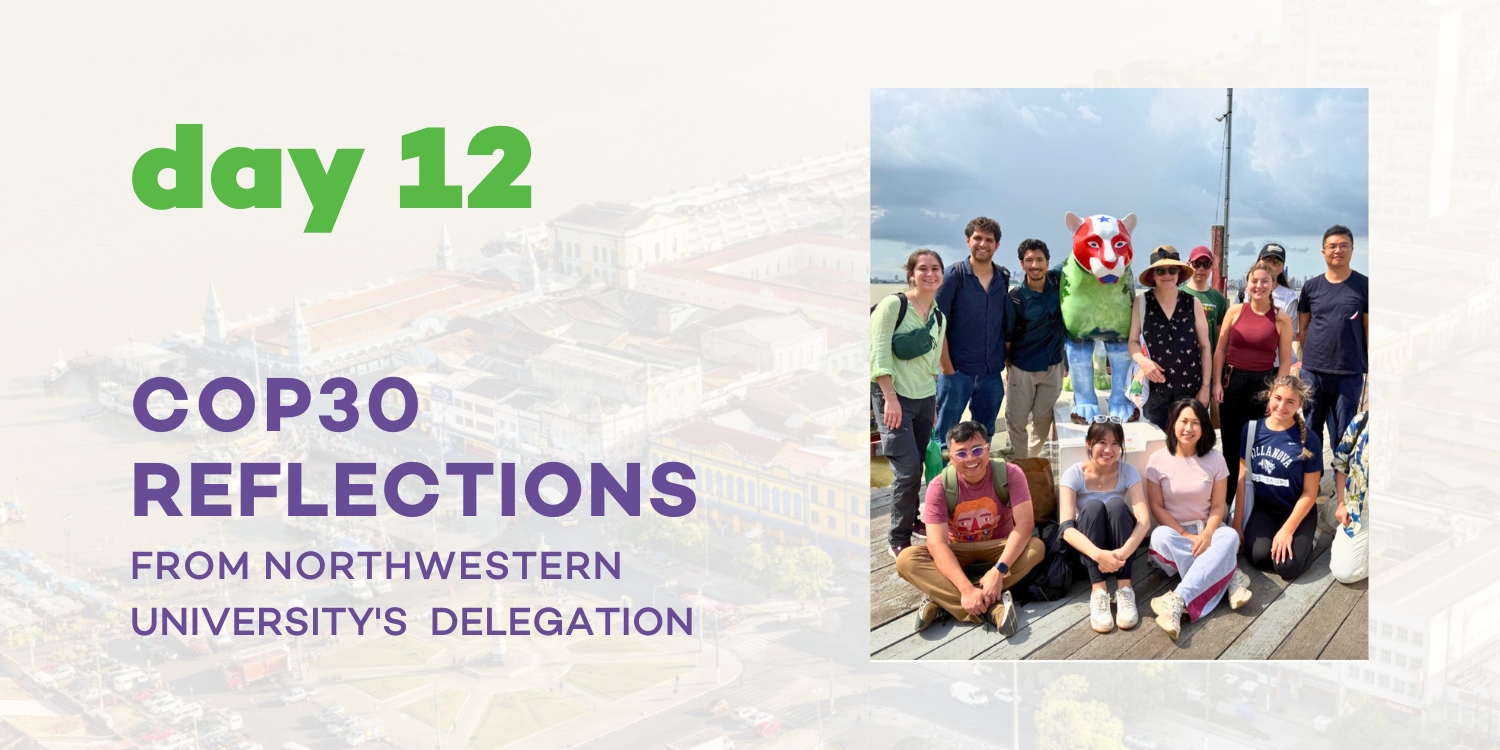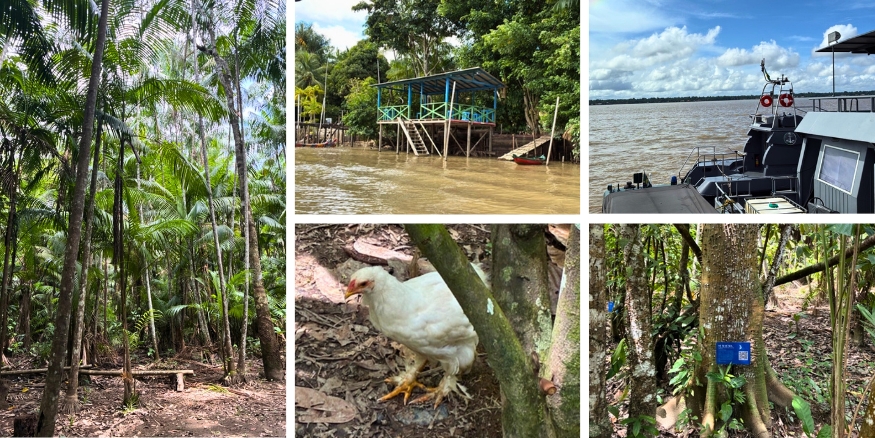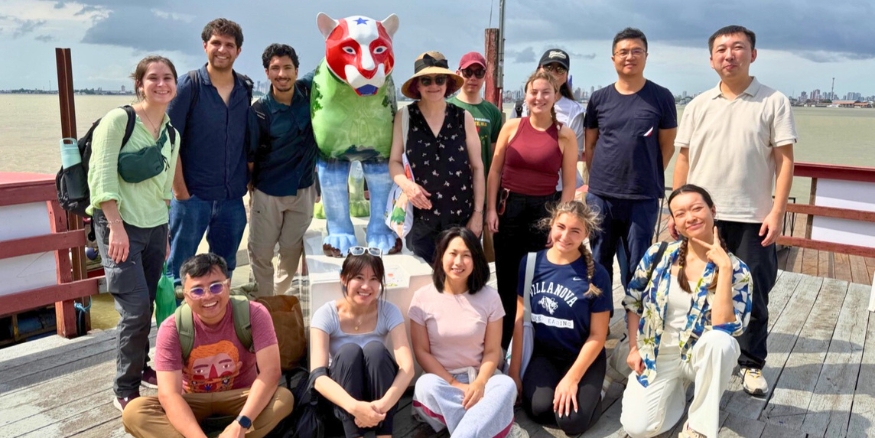Reflections from Northwestern University's COP30 Delegation: Day 12
For a fifth year, a delegation of Northwestern University students and faculty supported by the Roberta Buffett Institute is among more than 50,000 researchers, policymakers, industry leaders, and activists at the world’s largest annual international treaty negotiations and climate summit, the 30th Conference of Parties (COP30) to the United Nations Framework Convention on Climate Change (UNFCCC), held this year in Belém, Brazil. Each day, a different Northwestern delegate is blogging about their experiences and reflections. Day 12 features Gabriel Sánchez Ainsa, a PhD student in the Department of Philosophy.
I am Gabriel Sánchez Ainsa, a PhD student in the Department of Philosophy, thinking about climate change, human rights, and democratizing the UNFCCC. I am lucky enough that I get to document both our trip to the Amazon and our last day at COP30. Our day began with reports that the latest draft of the text had removed any mentions of a roadmap for the phasing out of fossil fuel. Latin American countries, small-island states, and the EU had been fighting to include this in the “mutirão” decision, but other countries, especially the Arab group, fought to get it out—let’s not forget that, according to the recent Advisory Opinion of the International Court of Justice, states’ failure to protect the climate through fossil fuel consumption, production, or subsidies violates international law. Outraged, many states sent a letter to the COP Presidency stating that they would block any agreement without a commitment to phasing out fossil fuel. On the other hand, it did not seem that the EU and other Global North states were going to move much further on climate finance, to the dismay of the Global South. In other words, we woke up to a paralyzed COP30 in the brink of collapse. (It did not help that the venue had caught on fire the day before). So, with nothing on the schedule, and no pavilions open because of the fire, we ventured to the Amazon.
Belém sits on the riverbed of the Amazon River, at the entrance of the largest rainforest in the world. Deforestation and climate change threaten to turn this beautiful and sacred place into a savannah. Belém was a rather clever choice for COP30—we could only have hoped that, if the world’s leaders could see what they had to protect, they would actually want to. We were too curious to see it for ourselves, and it did not disappoint. The Amazon is a beautiful and sacred place. I am afraid that I could not do it justice with words, so here are some pictures we wanted to share:
I should add here that, although awe-inspiring, the Amazon is very hot, and some of us were wearing our COP clothes, anticipating that a closing plenary would be called soon and we would have to come back at any moment.
Our boat tour took us through the river, making stops at many traditional and local businesses. We stopped at a place where they make and sell chocolate, a shop they sold crafts, a fisherwomen association, and, finally, a restaurant where we had lunch. The Amazon rainforest has a rather vibrant human community as well.
We were not alone in this trip. We had the great pleasure of joining two delegates from Villanova University, two representatives form Agora (German think tank), a member of Wikimedia press (and a Kellogg alumnus!), and some professors from Tsinghua University (who were “party overflow” for China’s delegation). I was able to have informal interviews with many of our fellow travelers, so our trip turned out to be rather helpful for my research project on how to reform and democratize the UNFCCC. They turned out to have rather divergent views from most of my other interviewees, so I was grateful to have ended up in a boat with them. Here is our picture:
After we finished our trip, we ventured back to the Blue Zone for the People’s Plenary. This plenary was organized by the rights-based constituencies: Women and Gender NGOs, Indigenous Peoples’ Organizations, Environmental NGOs, Trade Union NGOs, and the Youth NGOs. The Research and Independent Non-Governmental Organizations (RINGOs), our constituency, does not participate, but many members attend individually. This plenary looks less like a UN negotiation or assembly, and more like a political rally. The event began and ended with Indigenous ritual and song. They reported the results of the People’s Summit which took place during week 1, as a “counter-COP” to denounce the inaction and false solutions of the UNFCCC. The purpose of the plenary, in the end, is to connect all social and resistance movements with the climate movement.
Because of my research project on democratic reforms of the UNFCCC, it was exciting to see civil society organize itself in this way within UN space. It is worth noting that many local Indigenous Peoples without access to the Blue Zone organized protests last week, demanding not only climate action but also for protection against displacement. As a result, the UNFCCC and the Brazilian government militarized security around the Blue Zone. To enter the Blue Zone every day, we had to walk through many layers of heavily armed soldiers, carrying shields and M-15s. This limitations on civic space and human rights at COP30 to free speech and protest were heavily criticized by the UN Special Rapporteurs in a statement. In the meanwhile, we have received reports that 1 in every 25 participants roaming the halls of COP30 are fossil fuel lobbyists. As part of my research, I learned that civil society organizations are calling for an urgent reform of the UNFCCC—they want to shift the decision-making process from consensus to majority vote to avoid obstruction to climate action, conflict of interest rules to prevent the fossil fuel industry from capturing COPs, and greater transparency and accountability mechanisms.
During our trip, we learned how difficult it is for young people and universities everywhere to get funding and access to the Blue Zone, especially from the Global South. It is a tremendous privilege to be here, so I cannot but be grateful to the Roberta Buffett Institute and Northwestern University for making it happen. Many of us came with great cynicism, but we discovered that the COP is much more than closed-door negotiations among states. First of all, it is great fun to follow the negotiations day-after-day. Second, lots of excellent, free coffee (my vote goes to the Peruvian pavilion). Most importantly, global civil society is here, and they give us good reasons to be hopeful.
 Gabriel Sánchez Ainsa is a third-year PhD student in the Department of Philosophy at Northwestern University. His research focuses on the philosophical bases of international human rights law, especially how we may need to adapt it to confront the climate crisis and issues of environmental justice. Before starting his PhD, he served as an intern to the Frontline Resource Institute at the Environmental Defense Fund and as a virtual research assistant in the Climate Justice through the Courts, a transnational research project on the impact of human rights-based climate litigation.
Gabriel Sánchez Ainsa is a third-year PhD student in the Department of Philosophy at Northwestern University. His research focuses on the philosophical bases of international human rights law, especially how we may need to adapt it to confront the climate crisis and issues of environmental justice. Before starting his PhD, he served as an intern to the Frontline Resource Institute at the Environmental Defense Fund and as a virtual research assistant in the Climate Justice through the Courts, a transnational research project on the impact of human rights-based climate litigation.



